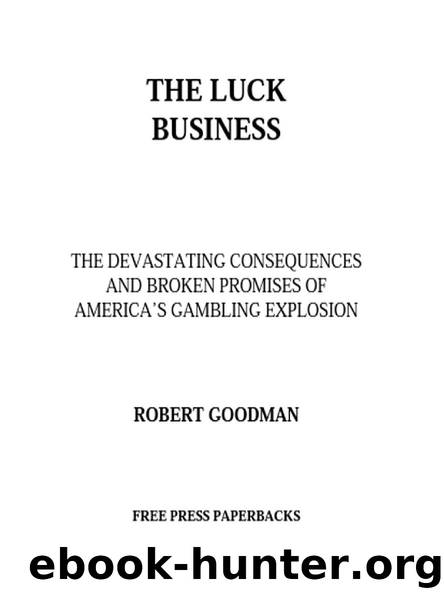THE LUCK BUSINESS by ROBERT GOODMAN

Author:ROBERT GOODMAN
Language: eng
Format: epub
Publisher: FREE PRESS PAPERBACKS
Published: 1996-07-15T00:00:00+00:00
The State as Dream Merchant
From a psychological perspective, people’s ability to dream and to hope for a better life can be a very healthy and useful human attribute. It helps them persevere under difficult circumstances, and it can motivate people to change and improve their lives. But by enticing people to spend their money on fantasies, governments are preying on people’s ability to dream and hope. Rather than providing real hope for economic improvement, public officials are promoting the illusion of economic improvement—becoming deeply involved in finding new ways of manipulating people’s desire for a more secure future. They are enticing people into taking part in what should properly be called the “pathology of hope.” When a government agency, like the New York State Lottery, says its players’ “whimsical fantasies” are being given “the hope of fulfillment” or that its gambling products offer people a chance to dream of paying off their debts or to dream about paying for their children’s education, then governments have gotten themselves into playing a new and very dangerous role. 5
By 1994, state lotteries were spending over $350 million a year to advertise their products. 6 In 1991, the California Lottery had become the largest purchaser of advertising in Los Angeles County. 7 Gregory Ziemak, Director of the Kansas Lottery and the former director of the Connecticut State Lottery, reflected on government’s schizophrenia of trying to both regulate and promote gambling. In his Connecticut job, Ziemak says, he was criticized by some legislators and community leaders for his advertisements. “They said just the fact that you’re advertising the lottery is wrong.” But the bottom line of keeping his job ultimately depended on pleasing politicians who were judging him by the revenues he generated. “My success or failure,” he said “was how sales were. Were sales better than last year, or were they worse?” 8
One of the most effective publicity techniques to promote more lottery play, according to Ziemak, was getting the media to produce stories about the winners. “People see a picture of a Lotto winner in the paper,” said Ziemak. “You know he’s a guy like you; he works in the shop, he has kids, he’s going to use the money to put the kids through college. You say, ‘You know maybe I could win’.” When some winners shun this publicity, lottery officials find ways of persuading them. According to Ziemak:
What we tell the winners is, look you won $5 million, that’s news. It’s public information whether you agree to talk to the press, or allow us to release it to the press, we’re still going to have to release your name, your town, and the amount won. And if we do that the press might call you because you’re not saving anything. Sometimes they get more interested. What we suggest you do, is go downstairs and talk to them. 9
Download
This site does not store any files on its server. We only index and link to content provided by other sites. Please contact the content providers to delete copyright contents if any and email us, we'll remove relevant links or contents immediately.
| Elections & Political Process | Ideologies & Doctrines |
| International & World Politics | Political Science |
| Public Affairs & Policy | Specific Topics |
| United States |
The Secret History by Donna Tartt(16623)
The Social Justice Warrior Handbook by Lisa De Pasquale(11489)
Thirteen Reasons Why by Jay Asher(7788)
This Is How You Lose Her by Junot Diaz(5771)
Weapons of Math Destruction by Cathy O'Neil(5036)
Zero to One by Peter Thiel(4824)
The Myth of the Strong Leader by Archie Brown(4789)
Promise Me, Dad by Joe Biden(4447)
Beartown by Fredrik Backman(4417)
Stone's Rules by Roger Stone(4415)
How Democracies Die by Steven Levitsky & Daniel Ziblatt(4398)
The Fire Next Time by James Baldwin(4342)
100 Deadly Skills by Clint Emerson(4077)
A Higher Loyalty: Truth, Lies, and Leadership by James Comey(4032)
Rise and Kill First by Ronen Bergman(4012)
The David Icke Guide to the Global Conspiracy (and how to end it) by David Icke(3881)
The Farm by Tom Rob Smith(3872)
Secrecy World by Jake Bernstein(3782)
The Doomsday Machine by Daniel Ellsberg(3731)
